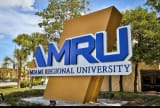Miami Regional University provides financial assistance to those who qualify. The Office of Financial Aid assists students in obtaining financial aid available to fund their education. Financial Aid representatives are available to assist students through a combination of onsite and offsite operations.
Financial aid is any grant, loan or scholarship to assist a student in meeting their University expenses. Federal and state agencies and/or the University itself usually provide funding. Most financial aid is based on the student’s financial need as determined by the federal government’s system of need analysis. Financial need is based on federal regulations and information provided by the student and/or student’s family on the Free Application for Federal Student Aid (FAFSA). The amounts and types of financial aid that a student can receive are determined by federal, state and institutional guidelines. Students who wish to be considered for financial assistance offered by/through the University must complete and submit the FAFSA.
- Student aid
- IRS
- Military Tuition Assistance
- Social Security Administration
- Department of Homeland Security
General Eligibility
- Be a U.S. citizen, permanent resident of the U.S., or an eligible non-citizen with a valid Social Security number
- Must not be simultaneously enrolled in elementary or high school
- Must have received a high school diploma or GED certificate
- Admitted into a degree, certificate, or other program leading to a recognized educational credential
- Maintain Satisfactory Academic Progress
- Not be in default for any Title IV loan at any institution
- Not have had federal benefits suspended due to a drug conviction
Nslds Disclosure
Required Disclosure Information for Borrowers
In accordance with HEOA 489 Amended HEA Sec. 485B, Miami Regional University is required to disclose to all borrowers that any federal loan borrowed by a student or eligible parent will be submitted to the National Student Loan Data System (NSLDS). The information reported to NSLDS will be accessible by guarantee agencies, lenders, and institutions determined to be authorized users of the data system. Borrowers may review their NSLDS history and information at any time at https://nslds.ed.gov/npas/index.htm
Grants
Federal Pell Grant
The Federal Pell Grant is a federal grant awarded based on financial need and does not need to be repaid. In order to apply for the Pell Grant, students must complete a Free Application for Federal Student Aid (FAFSA). The FAFSA is available on-line at https://studentaid.gov/fsa-id/sign-in/landing.
Federal Supplemental Educational Opportunity Grant (FSEOG):
FSEOG is available for students with exceptional financial needs, which means students with the lowest Expected Family Contributions (EFC). This program gives priority to students who receive Federal Pell Grants with the lowest EFC. An FSEOG award does not have to be repaid.
Scholarships
Miami Regional University offers a variety of scholarships for students who meet the specific criteria of the scholarship requirements.
Elio Grillo Scholarship – This scholarship provides tuition cost assistance for international students transitioning from ESOL into a degree program at MRU.
Dr. Juan G. Solana Scholarship – This scholarship provides tuition cost assistance for Foreign Physicians wishing to attend a Nursing Program.
Partners In Health Scholarship – This scholarship provides tuition cost assistance for students enrolled from a health care affiliate (chosen by the employer) in a program at Miami Regional University.
Displaced Student Scholarship – This scholarship provides tuition costs assistance for students who were displaced when their school, college or university closed. Student must apply within 120 of the institution’s closure.
Health Science Conversion Scholarship – This scholarship provides tuition cost assistance for pre-requisite class to enroll in the MSN -Direct Entry program.
Miami Regional University Business Professional Scholarship – This scholarship provides tuition cost assistance for students enrolling in the Business Administration program.
Dr. Angel Sousa Garcia Scholarship – This scholarship provides program cost assistance for graduate students enrolling in the Direct Entry program.
Believers in Our Mission Scholarship – This scholarship provides program cost assistance in the final semester of undergraduate students.
Pioneer Scholarship – This scholarship provides tuition cost assistance for graduate students pursuing doctoral study in Nursing at Miami Regional University.
Nursing the Future Scholarship – This scholarship provides tuition cost assistance for persons with an active registered nursing license with a need for prerequisite classes for the RN to BSN classes at Miami Regional University.
Educational Administration Scholarship – This scholarship is to provide tuition cost assistance for graduate students pursuing a master’s degree in Educational Administration at Miami Regional University.
Information on available scholarships is available in the catalog, beginning on page 42, or email: [email protected]
Loans
Federal Direct Loan Program (FDLP)
Miami Regional University participates in The Federal Direct Loan Program (FDLP) which allows students and their parents to borrow money to help with their educational costs. These loans must be paid back with interest.
Subsidized Direct Loan
A subsidized loan is awarded on the basis of financial need (need is the budgeted Cost of Attendance less estimated financial aid). The federal government pays interest on the subsidized loan until repayment begins and during authorized periods of deferment. Repayment begins six months after the student graduates, when enrollment drops below half-time status, or when a student withdraws from the University. Students’ borrowers of federal loans must also satisfy exit loan counselling requirements. To apply, students should contact the University’s Office of Financial Aid.
Unsubsidized Direct Loan
An unsubsidized loan is not awarded on the basis of need. The borrower is charged interest from the time the loan is disbursed until it is paid in full. In addition, until repayment begins and during authorized periods of deferment, the unsubsidized loan borrower has the option to pay the interest or allow the interest to accumulate. Accumulated interest will be added to the principal amount of the loan and will increase the amount the borrower must repay. Repayment begins six months after student graduates, when enrollment drops below half-time status, or when a student withdraws from the University. Students’ borrowers of federal loans must also satisfy exit loan counseling requirements. To apply, students should contact the University’s Office of Financial Aid.
Federal Direct Parent Loan (PLUS) for Loan Program
Federal Direct Parent Loan for Undergraduate Students (PLUS) loans are for parents of dependent students who want to borrow to help pay for their children’s education. A mandatory credit check is completed as eligibility for this loan depends on the borrower’s credit worthiness. This is an unsubsidized loan where the borrower is charged interest from the time the loan is disbursed until it is paid in full. In addition, until repayment begins and during authorized periods of deferment. Repayment begins 60 days after the loan is disbursed. For additional information, students should contact the University’s Office of Financial Aid.
Federal Direct Plus Loans (Grad Plus Loan)
The U.S. Department of Education makes Direct PLUS Loans to eligible graduate or professional students through schools participating in the Direct Loan Program. To receive a grad PLUS loan, a student must be a graduate or professional student enrolled at least half-time in a program leading to a graduate or professional degree or certificate; not have an adverse credit history (unless the student meets certain additional eligibility requirements); and satisfy the general eligibility requirements for federal student aid. For additional information, students should contact the University’s Office of Financial Aid.
Private Financing Programs
Private financing programs are available to help students meet the costs of education by providing long-term financing options. Students should exhaust all federal Title IV assistance available, including the Federal Direct Stafford Loan and the Federal Direct Graduate PLUS Loan, before considering a private student loan program. The repayment terms of federal programs may be more favorable than the terms of private loan programs. Federal student loans are required by law to provide a range of flexible repayment options, including, but not limited to, income-based repayment and income-contingent repayment plans, and loan forgiveness benefits, which other student loans are not required to provide. Federal Direct Loans are available to students regardless of income. For additional information, students should contact the University’s Office of Financial Aid.
Other Financial Options
Payment Plans with no interest are also available to all active MRU students. Students may apply to other financial providers such as Career Source Centers, Vocational Rehabilitation and the Florida Department of Veterans for Benefit of Education and Training if qualified. MRU is a training provider to these organizations.
To comply with the recommendations of public health authorities and ensure the health and safety of our campus, the Office of Financial Aid has limited hours for in-person service available Monday through Friday from 9:00 a.m. to 6:00 p.m.
We also offer online services to active and new students through our secure document upload system. Please contact our office to set-up your online file.
Please refer to the University Catalog, beginning on page 37 for all information pertaining to the Office of Financial Aid
Loan Forgiveness
The Dept. of Education is accepting applications for Loan Forgiveness ahead of the official launch to help them refine the process.
Student Loan Management
When you receive a federal student loan, you may not be required to make payments on that loan while you are in school, but you are required to repay the loan when you graduate or stop attending school at least half-time including fees and interest. It is important that you borrow responsibly so you’ll be able to repay your loan.
Borrowing responsibly includes borrowing only what you need to pay your education expenses and what you can realistically afford to repay when you leave school. The following videos will provide important information on student loan debt management.







